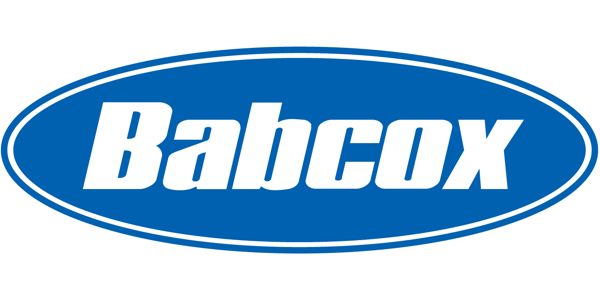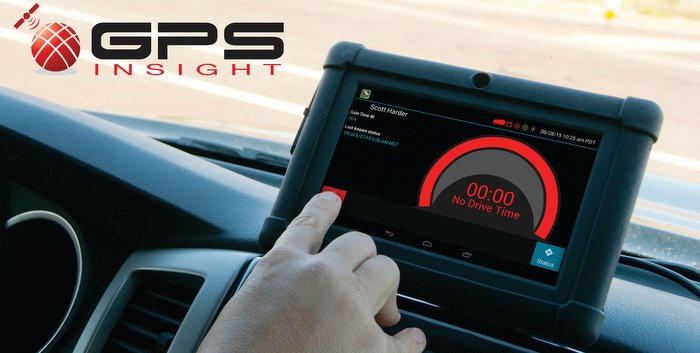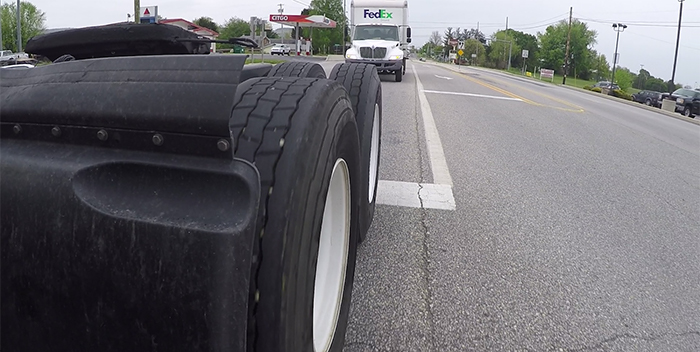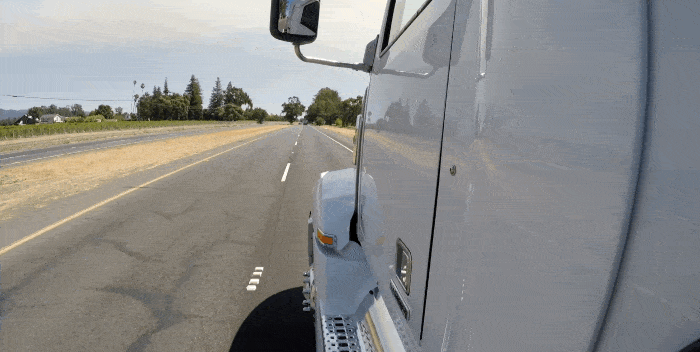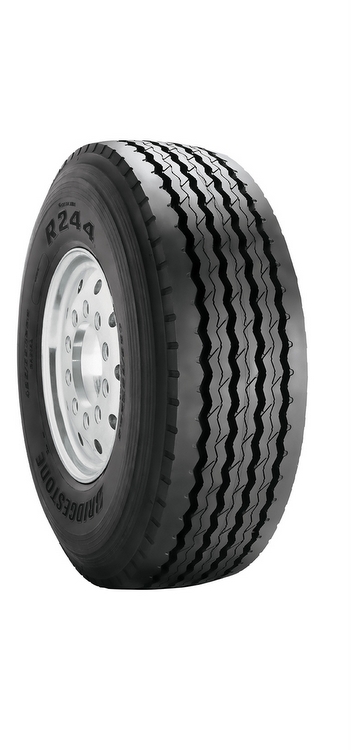True dedication
A concerted effort by AAA Cooper Transportation and its suppliers improves equipment and maintenance programs
When asked what things have contributed most to the success of equipment and maintenance programs in the nearly 29 years he’s been with AAA Cooper Transportation, Robert Floyd, director of maintenance, is quick to answer. “From our senior management to our newest employees,” he says, “there are many dedicated people, too many to mention, in fact. We have a great team of dedicated men and women throughout the system, and from where I sit, they are the greatest group of individuals anyone could have the pleasure to work with for so many years.
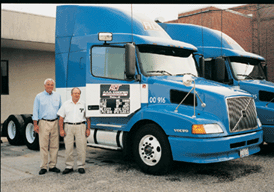
“We also have wonderful working relationships with all of our suppliers, and that’s something that’s contributed to our success, as well,” Floyd adds. “What we’ve found is that, by doing the best job we can in terms of maintenance, it’s easier for a manufacturer to help. We strive only to ask our suppliers for what we consider legitimate and fair. In return, it’s very seldom that we ask and don’t get help from our vendors.”
Beyond products, Floyd notes, all of AAA Cooper’s suppliers are very supportive companies. “You always have to make sure you’re getting the best prices, but it’s support that often drives our purchasing decisions,” he states. “Who stands behind us when there’s a problem is very important to us.”
Any measure
That philosophy is especially important because, by almost any measure, AAA Cooper is a large trucking operation. Based in Dothan, Ala., the company is a family-owned, non-union, regional less-than-truckload carrier. The fleet serves thousands of points in 12 southeastern states with next-day and two-day service through 78 terminals, as well as industrial areas of Chicago, Cincinnati, Louisville and Minneapolis. Additionally, AAA Cooper offers trailer load brokerage and dedicated services and meets customer needs in Puerto Rico as well as to and from Alaska, the Caribbean, Canada and Mexico through partner motor carriers.
The AAA Cooper fleet is sizable. Included in the operation are 862 single-axle and 1,372 tandem-axle tractors, 34 straight trucks and seven shop trucks, supplied by Volvo and GMC, as well as 88 Ottawa yard jockeys. Also on the equipment roster are 425 GM and Pontiac cars used by sales personnel and terminal managers and 672 electric- and propane-powered forklifts supplied by Caterpillar, Toyota and Nissan.
A mix of manufacturers supplies trailers in the AAA Cooper fleet. Included are 1,829 28-ft. Road Systems International and Great Dane pups, 2,882 53-ft and 861 48-ft. Wabash and Dorsey dry vans and a small group of flatbeds. In addition, the carrier operates 331 30-, 32- and 45-ft trailers equipped with Maxon lift gates as well as 662 convertor dollies from Great Dane and Road Systems.
Sourced mainly through Dothan-based Action Truck Center, a Volvo and GMC dealer, AAA Cooper bases its purchasing decisions on what works best in the fleet. In that regard, according to Floyd, engines play a large role in tractor choices.
“We’ve been running Volvo D12 engines for many years,” he relates, “and we’re seeing more than a million miles out of many of those units. We’ve also been realizing more than 10 years of service on our mid-range Volvo engines, and we recently purchased a number of GMC mid-range trucks equipped with Duramax diesels.
“When you standardize a fleet,” Floyd continues, “you have a better opportunity to learn what works well in your operation. That’s why we’ve stayed with the same vehicle and engine choices for many years and why we’ve spec’ed drivetrain, braking and air system components primarily from ArvinMeritor on Class 8 units. On Class 7 tractors and trucks, we use Eaton Fuller transmissions and clutches. In all cases, standardized specs reduce our parts inventory needs and make it easier to keep our technicians trained.”
Advantage
AAA Cooper’s supplier relationships also extend to evaluating new systems and components, something Floyd says is to the company’s advantage because it enables the fleet to eliminate concerns before a technology is introduced or mandated. One example of this process, he adds, is the company’s ongoing role as a Volvo test partner for the manufacturer’s engines.
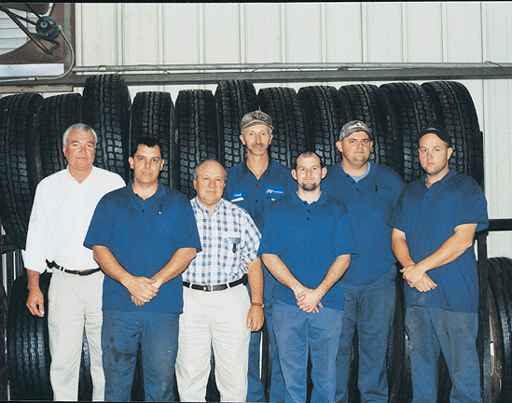
“We began working with Volvo to evaluate engines before the 2002, 2004 and 2005 models were introduced, and we’re now testing a D-13 engine, and in the near future, we will be testing a D-11 engine as well,” Floyd explains. “That evaluation also includes the new ultra-low sulfur diesel (ULSD) fuel. We have a dedicated tank for ULSD, and we run the trucks with test engines on routes that allow us to fuel them in our main facility. We’re also fueling three older tractors with ULSD to evaluate performance and fuel economy. While we remain concerned about the impact of 2007 emissions standards and ULSD, we’re better prepared for the changes because we’ve done our homework.”
The long-term value of serving as a test platform for new technologies is especially important to AAA Cooper, Floyd points out, because the fleet tends to operate power units for extended periods of time. In particular, trade cycles for its tandem-axle tractors are set at about nine years and between 960,000 and one million miles. Single-axle models are also operated for about nine years.
Maintenance expertise
The planned service life of company trucks, tractors and trailers demands a high level of maintenance expertise.
“The competition for technicians is tight at many of our locations, so we tend to develop and train a lot of our own staff,” Floyd notes. “Many of our technicians started working here in our truck wash or tire shop and on the grounds crews at different facilities. A full-scale training effort for the maintenance technicians involves suppliers who hold classes at company facilities. In addition, four full-time company trainers attend manufacturers’ schools and visit each of the carrier’s shops to provide ongoing training to all staff members.
In the company’s 40 shops, Floyd notes, the staff of almost 200 technicians works under the direction of truck, trailer and tire shop managers, handling most maintenance and repair work, including some warranty items. Truck dealers near facilities also are used for warranty repairs. Parts for all locations are sourced from dealers and FleetPride. In addition, the company is now implementing Maximus M5 maintenance management software to enhance its cost control and fuel and parts management processes. The Web-based system is expected to be fully operational by June.
One change in the company’s maintenance operation over the past five years involves maintenance at the 40 or so terminals without shop facilities.
“Until 2001, we relied mainly on outside vendors for this service,” Floyd relates. “While many of them did a good job for us, we increasingly found that they weren’t willing to invest in the more expensive diagnostic equipment required to effectively service electronically controlled systems on newer vehicles.”
Recognizing the need for a new approach to off-site maintenance, the answer, according to Floyd, was to field a group of seven fully equipped service trucks. Fitted with 24-foot van bodies with rollup doors and a liftgate, the Volvo chassis carry everything a technician needs to service equipment at five terminals without shops for one week. More than service trucks, the vehicles are small-scale mobile shops equipped with gasoline-powered generators, welders, compressors, hydraulic jacks and wheel dollies and a full complement of shop tools. They also carry an inventory of frequently used parts and mounted tires.
History of innovation
Innovative, effective approaches have been a hallmark of AAA Cooper Transportation throughout its 70-year history. The company, which traces its roots to John H. “Red” Dove, began hauling logs from the Alabama woods to sawmills in the early 1930s. In the 1950s, Dove first bought an interest in a local truck line and ultimately changed its name to AAA Motor Lines. Joined by his sons, Earl and Mack, the company expanded, including the purchase of Cooper Transfer Co. in 1969. The merger of the two companies in 1973 resulted in AAA Cooper Transportation. Over the intervening years, AAA Cooper has continued to grow and is now headed by Mack Dove’s son, Reid, who serves as president.
Today, AAA Cooper continues to prosper because it has remained true to its mission of providing quality service. Ongoing, for example, is a systemwide quality improvement program that encompasses the maintenance operation, all terminals and the carrier’s general offices. The program has led to ISO-9000 certification for AAA Cooper facilities.
There’s no secret to that success for Floyd, however. Behind all of that effort, he’s quick to note, is a dedicated group of hardworking and professional people. FE
SPECIAL FOCUS: AAA Cooper’s tire programs
To find an example of AAA Cooper’s practice of striving to perform effective maintenance and use its close supplier relationships to benefit its operation, look at the fleet’s tire programs. “We’ve involved everyone in tire maintenance, including our tire technicians, our drivers and our supplier, and it has paid off handsomely,” says Robert Floyd, director of maintenance. “The results in our tire costs speak for themselves.”
Supplied by Ollie Harrell Tire Service and Danzey Tire Service in Dothan, Ala., the AAA Cooper fleet runs on new Yokohama, Bridgestone and Michelin tires as well as Bandag retreads.
“We’ve found that the fuel mileage on all of these tires is so close that it’s hard to say if one brand is better than another,” Floyd says. “All of these tires have also exhibited good casing life. We cap our own casings three times before retiring them, and because the life of the cap depends on the integrity of the casing, that’s an important consideration.”
Floyd also is quick to praise AAA Cooper’s Bandag dealer and Ollie Harrell’s Tire Service.
“We give Ollie Harrell Tire Service our retreading and wheel refurbishing programs after tires have been inspected by our own tire shop,” Floyd says. “If they tell us a tire shouldn’t be retreaded, we accept their professional decision. As a result, we seldom have adjustments or failures. Our favorable tire performance is, in part, the result of a long and profitable relationship with our dealer that brings value for everyone.”
Most recently, Floyd notes, AAA Cooper started using the Meritor tire inflation system from PSI on 1,200 of its 28-ft. pup trailers to alert drivers of an underinflated tire during pre-trip inspections and on the road.
“We’ve already found that the PSI systems are adding considerably to tread life and are quickly paying for themselves in longer mileage,” he reports. “As good as our tire program is, our costs are even better with PSI.”
Floyd credits AAA Cooper’s tire technicians, as well.
“Their efforts play a key role in reducing blowouts,” he says. “In 1996, when our new tire program got underway, we had 168 blowouts in a single month. In one recent month, we had just 39 blowouts. While that’s a drastic reduction, it’s even more dramatic when you consider that our fleet has grown considerably, and today, we have about 20,000 additional wheel positions, compared to 10 years ago.
“We also work with our branch managers and drivers to help reduce tire costs,” Floyd continues. “Several years ago, for example, we had as many as 140 tires with sidewall damage in a single month. We communicated that concern to our drivers and provided them with training and information they needed to reduce those numbers. It wasn’t long before we saw a reduction to less than 40 sidewall damages per month.”
The key to all of AAA Cooper’s tire program success, Floyd points out, is sharing positive and negative results quickly with drivers, technicians and suppliers.
“That leads to solutions,” he states. “If you let people know what’s happening, they tend to continue to find ways to improve even further.”

